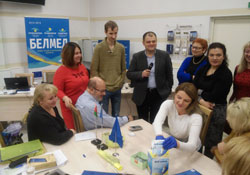Promoting healthy lifestyles and prevention of NCDs

WHO
Objective 1 of the BELMED project is to promote healthy lifestyles and the prevention of noncommunicable diseases (NCDs), with the aim of reducing the impact of the most significant NCD risk factors – excessive alcohol consumption, smoking, unhealthy diet and low levels of physical activity.
This objective is led by the United Nations Children’s Fund (UNICEF) and WHO.
Activities undertaken towards this objective include successful implementation of the STEPwise approach to surveillance (STEPS) survey. The STEPS survey is a WHO-recommended, representative, countrywide study on risk factors of major NCDs in adults 18–69 years of age. The Republican Scientific and Practical Centre for Medical Technologies, Informatization, Administration and Management of Health, assigned by the Ministry of Health as the implementing agency for the STEPS survey in close collaboration with WHO experts, completed the survey. The process involved the following steps.
- The field work was completed, covering 5010 respondents with the high participation rate of 87%. The survey included validated questionnaires to determine risk factors for NCDs, as well as anthropometric measurements including blood pressure, body mass index, waist circumference measurement, and biochemical blood (cholesterol, glucose) and urine tests.
- The data obtained from the survey were analysed with the support of WHO experts, and a final report on the STEPS survey was published in Russian and English.
- A national conference to present the results of the STEPS survey was held in Minsk on 29 August 2017. Participants included the Minister of Health, WHO experts, and 88 specialists in the field of NCD prevention. The final STEPS report was printed and distributed among the participants.
- In accordance with a statement of the Minister of Health, the results of the STEPS survey will be used for NCD risk factor surveillance within the context of the national programme “People’s health and demographic security of the Republic of Belarus”. Cooperation is anticipated in conducting a second round of the STEPS survey to monitor the results of the national programme in 2019–2020.



